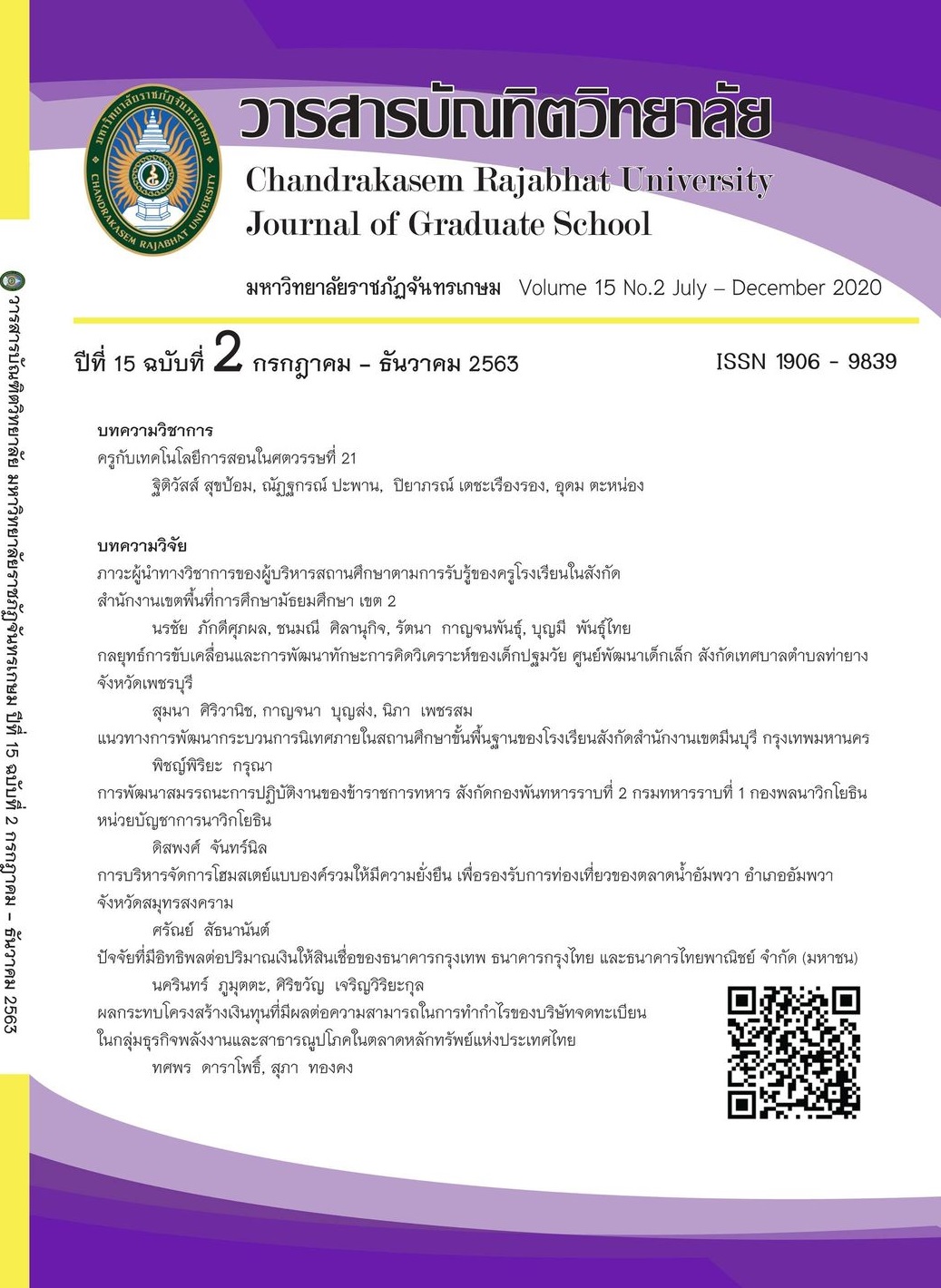การพัฒนาสมรรถนะการปฏิบัติงานของข้าราชการทหาร สังกัดกองพันทหารราบที่ 2 กรมทหารราบที่ 1 กองพลนาวิกโยธิน หน่วยบัญชาการนาวิกโยธิน
Main Article Content
บทคัดย่อ
การวิจัยครั้งนี้มีวัตถุประสงค์เพื่อศึกษา (1) ระดับการพัฒนาสมรรถนะการปฏิบัติงานของข้าราชการทหาร สังกัดกองพันทหารราบที่ 2 กรมทหารราบที่ 1 กองพลนาวิกโยธิน หน่วยบัญชาการนาวิกโยธิน (2) ปัจจัยในการปฏิบัติงานของข้าราชการทหาร สังกัดกองพันทหารราบที่ 2 กรมทหารราบที่ 1 กองพลนาวิกโยธิน หน่วยบัญชาการนาวิกโยธิน (3) ปัจจัยในการปฏิบัติงานที่มีความสัมพันธ์เชิง เหตุ-ผล กับการพัฒนาสมรรถนะการปฏิบัติงานของข้าราชการทหาร สังกัดกองพันทหารราบที่ 2 กรมทหารราบที่ 1 กองพลนาวิกโยธิน หน่วยบัญชาการนาวิกโยธิน กลุ่มตัวอย่างที่ใช้ในการวิจัย ได้แก่ ข้าราชการทหารสังกัดกองพันทหารราบที่ 2 กรมทหารราบที่ 1 กองพลนาวิกโยธิน หน่วยบัญชาการนาวิกโยธิน จำนวน 138 คน วิเคราะห์ข้อมูลโดยใช้ค่าสถิติเชิงพรรณนา ได้แก่ ค่าร้อยละ ค่าเฉลี่ย ค่าเบี่ยงเบนมาตรฐาน และสถิติเชิงอนุมาน โดยใช้สถิติค่าไคสแควร์ และการวิเคราะห์การถดถอยพหุคูณ
ผลการศึกษาพบว่า (1) การพัฒนาสมรรถนะการปฏิบัติงานของข้าราชการทหาร สังกัดกองพันทหารราบที่ 2 กรมทหารราบที่ 1 กองพลนาวิกโยธิน หน่วยบัญชาการนาวิกโยธิน ในภาพรวมมีการพัฒนาอยู่ในระดับมาก เมื่อพิจารณารายด้านพบว่า การพัฒนาอยู่ในระดับมาก เรียงตามลำดับ ดังนี้ ความคิดเห็นเกี่ยวกับตนเอง ความรู้ บุคลิกลักษณะประจำตัวบุคคล และมีการพัฒนาอยู่ในระดับปานกลาง เรียงตามลำดับดังนี้ ทักษะความเชี่ยวชาญ และแรงจูงใจ (2) ปัจจัยในการปฏิบัติงานของข้าราชการทหาร สังกัดกองพันทหารราบที่ 2 กรมทหารราบที่ 1 กองพลนาวิกโยธิน หน่วยบัญชาการนาวิกโยธิน พบว่า ในภาพรวมมีการปฏิบัติงานอยู่ในระดับมาก เรียงตามลำดับดังนี้ ความสัมพันธ์กับเพื่อนร่วมงาน ลักษณะงานที่ปฏิบัติ ความสัมพันธ์กับผู้บังคับบัญชา เทคโนโลยีสารสนเทศ และมีการปฏิบัติงานอยู่ในระดับปานกลาง ได้แก่ ความก้าวหน้า (3) ปัจจัยในการปฏิบัติงาน ในภาพรวมมีความสัมพันธ์เชิง-เหตุผลกับการพัฒนาสมรรถนะการปฏิบัติงานของข้าราชการทหาร สังกัดกองพันทหารราบที่ 2 กรมทหารราบที่ 1 กองพลนาวิกโยธิน หน่วยบัญชาการนาวิกโยธิน ในด้านลักษณะงานที่ปฏิบัติ ด้านความก้าวหน้า ด้านความสัมพันธ์กับผู้บังคับบัญชา ด้านความสัมพันธ์กับเพื่อนร่วมงาน และ ด้านเทคโนโลยีสารสนเทศ ในภาพรวมมีความสัมพันธ์เชิงเหตุ-ผลกับการพัฒนาสมรรถนะการปฏิบัติงานของข้าราชการทหาร สังกัดกองพันทหารราบที่ 2 กรมทหารราบที่ 1 กองพลนาวิกโยธิน หน่วยบัญชาการนาวิกโยธิน ในด้านลักษณะงานที่ปฏิบัติ อย่างมีนัยสำคัญทางสถิติที่ระดับ 0.001
Article Details

อนุญาตภายใต้เงื่อนไข Creative Commons Attribution-NonCommercial-NoDerivatives 4.0 International License.
เอกสารอ้างอิง
กวีพล สุนทรรัตน์. (2557). แรงจูงใจที่มีผลต่อการปฏิบัติงานของพนักงานรัฐวิสาหกิจ กรณีศึกษา บริษัท ท่าอากาศยานไทย จำกัด (มหาชน) (การค้นคว้าอิสระปริญญามหาบัณฑิต). กรุงเทพฯ : สถาบันเทคโนโลยีพระจอมเกล้าเจ้าคุณทหารลาดกระบัง.
กฤตชน วงศ์รัตน์. (2555). การพัฒนาสมรรถนะในการปฏิบัติงานของผู้จัดการฝ่ายผลิตในโรงงานอุตสาหกรรมไฟฟ้าและอิเล็กทรอนิกส์. วารสารวิชาการพระจอมเกล้าพระนครเหนือ, 22(1), 131 - 141.
เกศณรินทร์ งามเลิศ. (2559). แรงจูงใจที่มีผลต่อประสิทธิภาพในการปฏิบัติงานของพนักงาน และลูกจ้างองค์การคลังสินค้า (การค้นคว้าอิสระปริญญามหาบัณฑิต). กรุงเทพฯ : มหาวิทยาลัยกรุงเทพ.
ฐิติศักดิ์ รัตนสัมฤทธิ์. (2560). สมรรถนะหลักในการถวายงานอารักขาของข้าราชการตำรวจ กองกำกับการถวายอารักขาและรักษาความปลอดภัย กองบังคับการสืบสวนสอบสวน ตำรวจภูธรภาค 7 (วิทยานิพนธ์ปริญญามหาบัณฑิต) เพชรบุรี : มหาวิทยาลัยนานาชาติแสตมฟอร์ด.
ธวัช เนียมสิน. (2560). การพัฒนาสมรรถนะในการปฏิบัติงานของข้าราชการตำรวจในสังกัดตำรวจภูธรจังหวัดเพชรบุรี (วิทยานิพนธ์ปริญญามหาบัณฑิต). เพชรบุรี : มหาวิทยาลัยนานาชาติแสตมฟอร์ด.
ธวัชชัย มะลิซ้อน. (2554). ความคิดเห็นเกี่ยวกับการพัฒนาบุคลากรของข้าราชการทหารกอง 8 ศูนย์รักษาความปลอดภัย กองบัญชาการกองทัพไทย (วิทยานิพนธ์ปริญญามหาบัณฑิต). กรุงเทพฯ : มหาวิทยาลัยเกษมบัณฑิต.
พงษ์ศักดิ์ สมบุญ. (2557). ยุทธศาสตร์การบริหารทรัพยากรบุคคลสนับสนุนการเป็นกองทัพเรือสมรรถนะสูง. เอกสารประจำภาควิทยาลัยกองทัพเรือ, กรมยุทธศึกษาทหารเรือ.
วิชิต อู่อ้น. (2548). การวิจัยและการสืบค้นข้อมูลทางธุรกิจ. กรุงเทพมหานคร: พริ้นท์แอทมี (ประเทศไทย).
เสาวลักษณ์ ฉายรุ้ง. (2557). สมรรถนะการปฏิบัติงานของบุคลากรในธุรกิจโรงแรม เขตอำเภอเมือง จังหวัดสงขลา (วิทยานิพนธ์ปริญญามหาบัณฑิต). สงขลา : มหาวิทยาลัยราชภัฏสงขลา.
Ebersole, S. (2012). Media determinism in cyberspace. Retrieved from http://www.regent.Edu/ acad/schcom/rojc/mdic/md.html
Herzberg, F. (1959). The Motivation to work. New York: John Wiley and Sons.
Greenl,G.B. (1991). How Many Subjects Dose It Take to Do a Regression Analysis? Multivariate Behavioral Research, Retrieved from http://research.kbu.ac.th/home/journal/pdf/journal_v15_no1.pdf.
Mcclelland, D. (1973). Testing for competence rather than for “intelligence”. American Psychologist, 28(1), 1-14.


